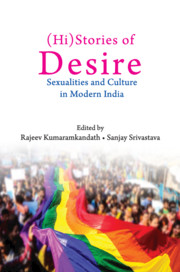Book contents
- Frontmatter
- Contents
- List of Images
- Acknowledgements
- Introduction: Sexuality and Sexualities
- 1 Politics of Prop Roots: Beyond ‘The Repressive Hypothesis’
- 2 Of Identities and Other Desires: Thinking about Sexualities
- 3 The Stuttered Process of Subject Formation: A Sex Worker's Experiments with Narration
- 4 Sexual Realism? (Hetero)Sexual Excess and the Birth of Obscenity in Malayalam Literature
- 5 Sexualizing Kālā Pāni
- 6 Memories of a Queer Sexuality: Revisiting Two ‘Toto’ Folk Tales
- 7 Learning about Sex in Mumbai: Rethinking the ‘Knowledge Gap’ Debate in Sexuality Education
- 8 Family Planning and the Masculinity of Nirodh Condoms in India
- 9 Women and Their Bodies: Menstrual Celebrations and Construction of Sexuality in Assam
- 10 Tanjai Prakash: Between Desire and Labour
- 11 Hijra Intimacies and Inheritances
- Notes on Editors and Contributors
- Index
5 - Sexualizing Kālā Pāni
Published online by Cambridge University Press: 24 December 2019
- Frontmatter
- Contents
- List of Images
- Acknowledgements
- Introduction: Sexuality and Sexualities
- 1 Politics of Prop Roots: Beyond ‘The Repressive Hypothesis’
- 2 Of Identities and Other Desires: Thinking about Sexualities
- 3 The Stuttered Process of Subject Formation: A Sex Worker's Experiments with Narration
- 4 Sexual Realism? (Hetero)Sexual Excess and the Birth of Obscenity in Malayalam Literature
- 5 Sexualizing Kālā Pāni
- 6 Memories of a Queer Sexuality: Revisiting Two ‘Toto’ Folk Tales
- 7 Learning about Sex in Mumbai: Rethinking the ‘Knowledge Gap’ Debate in Sexuality Education
- 8 Family Planning and the Masculinity of Nirodh Condoms in India
- 9 Women and Their Bodies: Menstrual Celebrations and Construction of Sexuality in Assam
- 10 Tanjai Prakash: Between Desire and Labour
- 11 Hijra Intimacies and Inheritances
- Notes on Editors and Contributors
- Index
Summary
There are two integrated facts about Kālā Pāni that should interest anyone who researches into the history of penal ideas: the Government was too anxious and impatient to populate the islands by any means so that it could control the ocean and the Empire, and it emphatically negotiated with the transported convicts in developing an elaborate convict society while showing its anxiety over its overall governance. Among the numerous steps taken in the initial decades, the requirement for well-behaved convicts and the demand for marriageable women remain so strong that the documents not only interrogate the intellectual and moral continence the British preached so much for but they also indicate, in principle, that the British were as lascivious as their native counterparts who, it was believed, embraced the Kāma Sutra in their everyday life (Ballhatchet 1980; Sen 2004: 2011). On the one hand, the deportation of 1857 mutineers, political prisoners, petty criminals, and hard convicts projects British attitude of developing the Andamans as a regular penal settlement. On the other hand, the transportation of public women, infanticidal mothers, and young female convicts remains another chapter that is relatively less explored (Sen 2011; Ludwig 2013). This chapter explores the repressive history of human copulation in Kālā Pāni, which requires critical investigation. It also projects that the Empire took to its practice a libidinal logic in controlling the population and in patronizing the colonized spaces.
This chapter explores archival sources – historical, cultural, and judicial – and (auto)biographical narratives of colonial subjects imprisoned in the penal settlement of the Andamans. While I argue that the postcolonial Indian nation highly romanticizes the sacrifice of freedom fighters incarcerated in the muchhyped Cellular Jail, I suggest that the contribution of ‘hereditary’ criminals, murderers, and petty offenders – convicted explicitly for the purpose of controlling the ocean and the geographical spaces of the Andamans – remains significant yet less explored. In negating the ‘glorified’ freedom struggle of the First War of Independence, otherwise known as the 1857 Mutiny, I consider the aftermath of prison transportation into purview so as to explore the effect of taming of convicts at Kālā Pāni.
- Type
- Chapter
- Information
- (Hi)Stories of DesireSexualities and Culture in Modern India, pp. 79 - 95Publisher: Cambridge University PressPrint publication year: 2020
- 1
- Cited by



